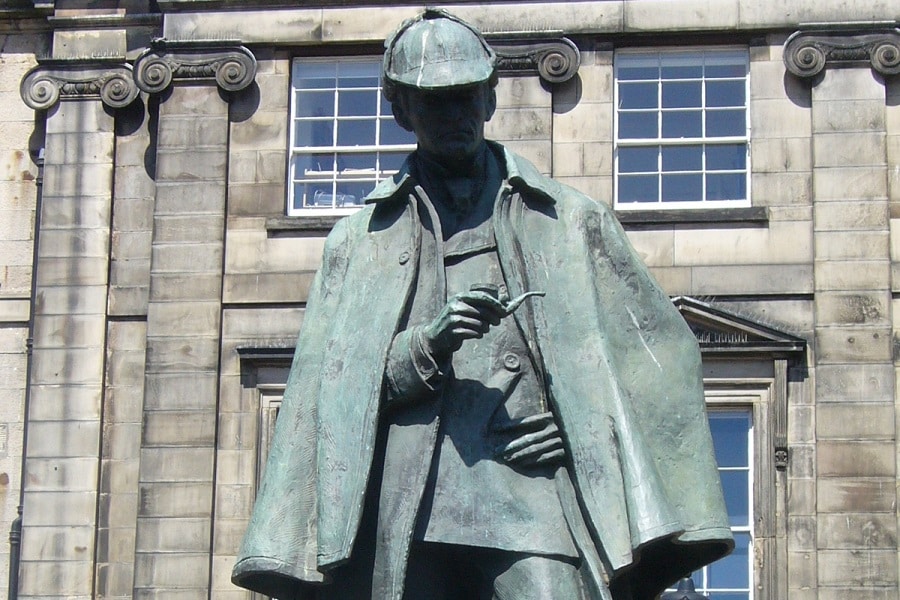
Sherlock Holmes Characteristics
Ladies and gentlemen, hold onto your deerstalkers because we’re about to delve into the enigmatic world of Sherlock Holmes, the brainchild of Sir Arthur Conan Doyle. This detective, with his unparalleled intellect and eccentricities, has not only captivated readers for generations but also set the gold standard for detective fiction. Holmes’s character is a fascinating amalgamation of razor-sharp wit, keen observation, and a touch of the bizarre, making him a timeless icon in the realm of mystery and crime-solving.
First things first, Holmes’s intellect is as legendary as his pipe. This detective isn’t just smart; he’s a walking, talking encyclopedia of knowledge. His ability to deduce the most intricate details from the most mundane observations is nothing short of miraculous. Remember “A Study in Scarlet”? That’s where it all began. Doyle presents Holmes as a man who can deduce a whole narrative from a single drop of ink or a scuff on a shoe. His mind is like a supercomputer, processing the tiniest of details to solve the most baffling of cases.
But it’s not just his intelligence that sets Holmes apart. It’s his unique methodology. Unlike the brawny detectives who rely on muscle, Holmes uses his brain. He’s the epitome of the phrase ‘mind over matter’. This approach was groundbreaking at the time Doyle penned his stories, and it remains influential in detective fiction to this day. Take “The Sign of Four”, for instance. Holmes showcases his method of deductive reasoning, turning the art of detection into a science.
Then there’s his eccentric personality. Holmes is not your average Joe. He’s as quirky as they come. His Bohemian lifestyle, his bouts of deep depression juxtaposed with periods of intense activity, and his penchant for disguise and drama add layers to his character. These traits make him unpredictable and fascinating. In “The Adventure of the Blue Carbuncle”, we see Holmes’s peculiar habit of keeping his tobacco in a Persian slipper, showcasing the quirkiness that endears him to readers.
Holmes’s relationship with Dr. John Watson, his faithful friend and chronicler, adds another dimension to his character. Watson is more than just a sidekick; he’s the lens through which readers view Holmes. Through Watson’s eyes, we see Holmes’s genius and his flaws. Their camaraderie, as depicted in stories like “The Hound of the Baskervilles”, provides a human touch to Holmes’s otherwise aloof persona.
Now, let’s talk about his influence on screen adaptations. Holmes has been portrayed by a myriad of actors, each bringing their own flavor to the character. From Basil Rathbone’s portrayal in the 1940s to Robert Downey Jr.’s action-packed interpretation, Holmes’s adaptability to different eras and audiences speaks volumes about his timeless appeal. The BBC series “Elementary” and the American TV show “House M.D.” (yes, Gregory House is essentially a modern-day, medical Holmes) are testament to how Holmes’s characteristics transcend time and genre.
Holmes’s impact extends beyond the realm of entertainment. He has influenced real investigative techniques. His methods of deduction and logical reasoning are taught in criminal psychology and forensic science courses. Holmes was using forensic science before it was even a recognized field. Remember “The Adventure of the Norwood Builder”? Holmes’s use of fingerprinting was ahead of its time.
What makes Sherlock Holmes a character for the ages is not just his brilliant mind or his peculiar habits. It’s his universal appeal. He embodies the eternal human quest for truth and justice. Despite his flaws and eccentricities, or perhaps because of them, Holmes resonates with each reader and viewer uniquely. Doyle created not just a character but a legend.
In the vast landscape of detective fiction, Sherlock Holmes stands as a colossus. His legacy is not just in the clever mysteries or the thrilling adventures. It’s in the way he makes us think, observe, and deduce. Holmes is not just a detective; he’s a phenomenon, an enigma, a blueprint for the modern detective. From the foggy streets of Victorian London to the screens of the 21st century, the figure of Sherlock Holmes looms large, as intriguing and enigmatic as ever. He’s not just a character in a story; he’s a part of our cultural fabric, a symbol of intellect and eccentricity. And that, ladies and gentlemen, is the enduring magic of Sherlock Holmes.
More Detective Features
Priest Detectives
These holy detectives are not content with the mysteries of faith
The Characteristics of Hercule Poirot
Peculiar habits and unmatched deductive abilities
Detective Novels
The pinnacle of sleuthing



